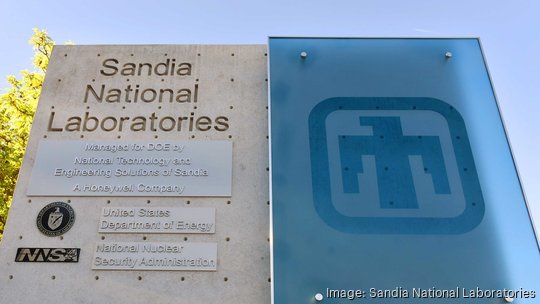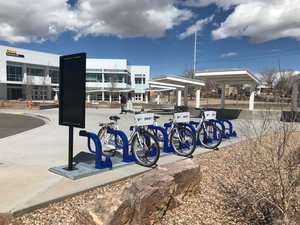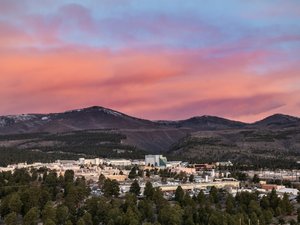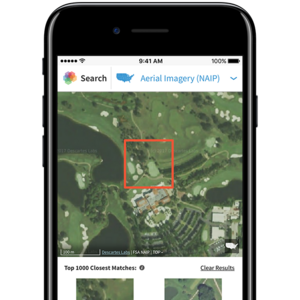
After unlocking upwards of $125 million for developing the region's quantum industry through a federal "Tech Hub" designation, an interstate coalition is plotting its next hundred-million-dollar funding bid — this one focused on quantum technology in New Mexico.
Zachary Yerushalmi, CEO of the 120-member quantum consortium Elevate Quantum, told New Mexico Inno about the coalition's follow-up funding effort. He said it'll come in the form of a U.S. National Science Foundation (NSF) Regional Innovation Engines proposal.
The NSF's Engines program, authorized under the CHIPS and Science Act of 2022, awards federal dollars to regional innovation ecosystems "that have not fully participated in the technology boom of the past few decades," according to the NSF's website.
Individual program awardees receive $15 million up front and up to $160 million over a 10-year period for economic and technological development efforts. The NSF named 10 inaugural awardees in January, including one proposal led by the University of Texas at El Paso that included New Mexico partners like Spaceport America. That award was suspended pending NSF review, El Paso Matters reported in May.
A New Mexico-led proposal, dubbed the Space Valley Coalition, missed out on a full Engines award, however, instead receiving a $1 million development grant. To date, New Mexico's been skipped over by major government-run regional technology programs — the NSF's Engines program, and the U.S. Economic Development Administration's (EDA) Regional Technology and Innovation Hubs, or Tech Hubs, program.
Yerushalmi hopes Elevate Quantum's NSF Engines proposal can change that.
While the bulk of the funding Elevate Quantum's Tech Hubs awards unlocked — $127.5 million total — will flow up to Colorado, the consortium's NSF Engines proposal will have a specific focus on quantum research and development in New Mexico. The proposal will be led by Elevate Quantum members in New Mexico, Yerushalmi said.
The NSF proposal would complement the regional Tech Hubs award by bidding for federal dollars focused on early-stage quantum technologies — those at "technology readiness levels," or TRLs, between 1 and 3 on a scale that goes up to 9 as a measure of a specific technology's maturation level.
The EDA Tech Hubs award, in contrast, is intended to commercialize more mature quantum technologies, those at TRLs of 7 or above.
There are three specific tech areas Yerushalmi said the NSF proposal would focus on. Those include position, navigation and timing, or PNT, quantum technology, a more advanced sort of global position system; quantum "operational technology," or OT, the hardware and software that controls physical assets like nuclear reactors or energy grids; and quantum computing technology with a specific focus on materials science, which would help create commercially viable quantum systems in a broad range of fields.
"That's our kind of ticket to the Jetsons age," Yerushalmi said about quantum computing technology in particular.
Not all of those technology areas are at the same stage. Quantum PNT and OT are closer to practical viability, with a time frame of around five years, whereas commercial quantum computing is a bit further away, closer to 10 years, Yerushalmi said; the NSF Engines proposal would fund advancements in all three tech areas over a decade-long period, if awarded.
Yerushalmi said the consortium plans to start with four teams focused on those three technology areas, before selecting one or two teams. Each of the first four teams would receive around $3 million from the initial $15 million the proposal would receive, if selected, for around two years of developmental work.
Then, once the selection happens after those two years, the pair of remaining teams would be the focus of the rest of the federal dollars, totaling up to around $100 million over a 10-year period.
It'd be a big deal for New Mexico if those federal dollars come through, said Jake Douglass, quantum business development lead at Sandia National Laboratories.
While quantum research and development has long been a focus of labs and universities in New Mexico, like Sandia, Los Alamos National Laboratory and the University of New Mexico, and while other educational institutions like Central New Mexico Community College have made recent strides toward quantum technology advancement, the private sector quantum industry has lagged behind in the state.
Douglass said putting together the NSF proposal and, hopefully, landing the federal dollars will help "coalesce" those existing players and new industry partners.
"That builds on historical strengths," Douglass added. "Sandia's been fabricating quantum devices for decades, and we've just never had the commercial impact.
"We work with industry partners all the time, but then they go to other states," he continued. "So, the Engine will allow us to really launch a quantum industrial sector here."
Douglass reiterated the three quantum technologies the Engines proposal would focus on — position, navigation and timing technology, operational technology and quantum computing technology — have different development time frames, with quantum sensing related to PNT being the shortest and quantum computing being the longest.
But instead of waiting up to a decade to see tangible technological advancements, he said the proposal's being set up to have "both early wins and then long-term wins." Douglass added building a tech foundation in all three areas over the course of the proposal's 10-year funding period would not only complement the region's Tech Hub work, but it would also impact existing economic development focus areas in New Mexico — anything from sustainable energy to advanced manufacturing to aerospace.








